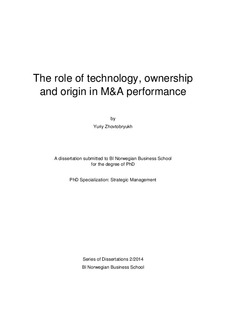The role of technology, ownership and origin in M&A performance
Doctoral thesis
Permanent lenke
http://hdl.handle.net/11250/191412Utgivelsesdato
2014Metadata
Vis full innførselSamlinger
Sammendrag
he massive value destruction for the acquiring firm shareholders found in recent studies on M&A performance puts a big question mark over M&A as a corporate growth strategy. However, not all M&A destroy value, which makes identification of the deal and firm characteristics that affect value creation and destruction in M&A a major issue in corporate strategy.
This dissertation focuses on three such characteristics: (1) type of M&A (technological or non-technological), (2) ownership (private equity or industrial acquirer), and (3) the origin of the focal firms (cross-border M&A or domestic M&A). Particularly, I suggest that technology commercialization and leveraging of the innovation capabilities of the acquiring firm are two sources of value creation that are only available in technological M&A and have different value to different acquirers, which results in higher potential for value creation in technological M&A relative to non-technological ones.
Further, I argue that industrial acquirers are better positioned to create value in technological M&A than private equity firms due to the availability of complementary production, marketing and distribution assets necessary for profitable technology commercialization. At the same time, strong managerial incentives and restructuring undertaken by private equity firms fits better non-technological targets.
Finally, I suggest that acquirers gain more in technological cross-border M&A than in non-technological cross-border M&A and in technological domestic M&A because of the higher potential to gain from internally exploiting the technology assets of the target firm in a foreign setting, access to a larger and more diverse pool of technology assets and local knowledge spillovers. The obtained results support the arguments and are robust to alternative explanations.
